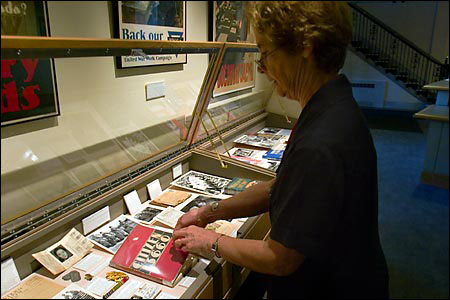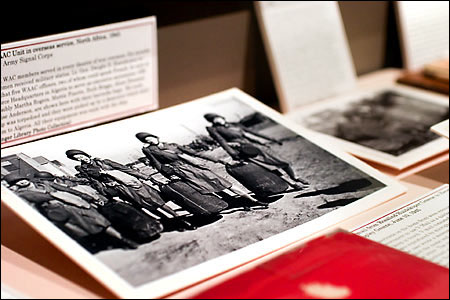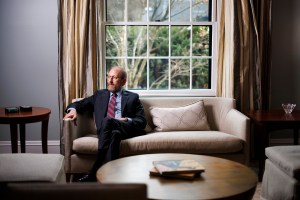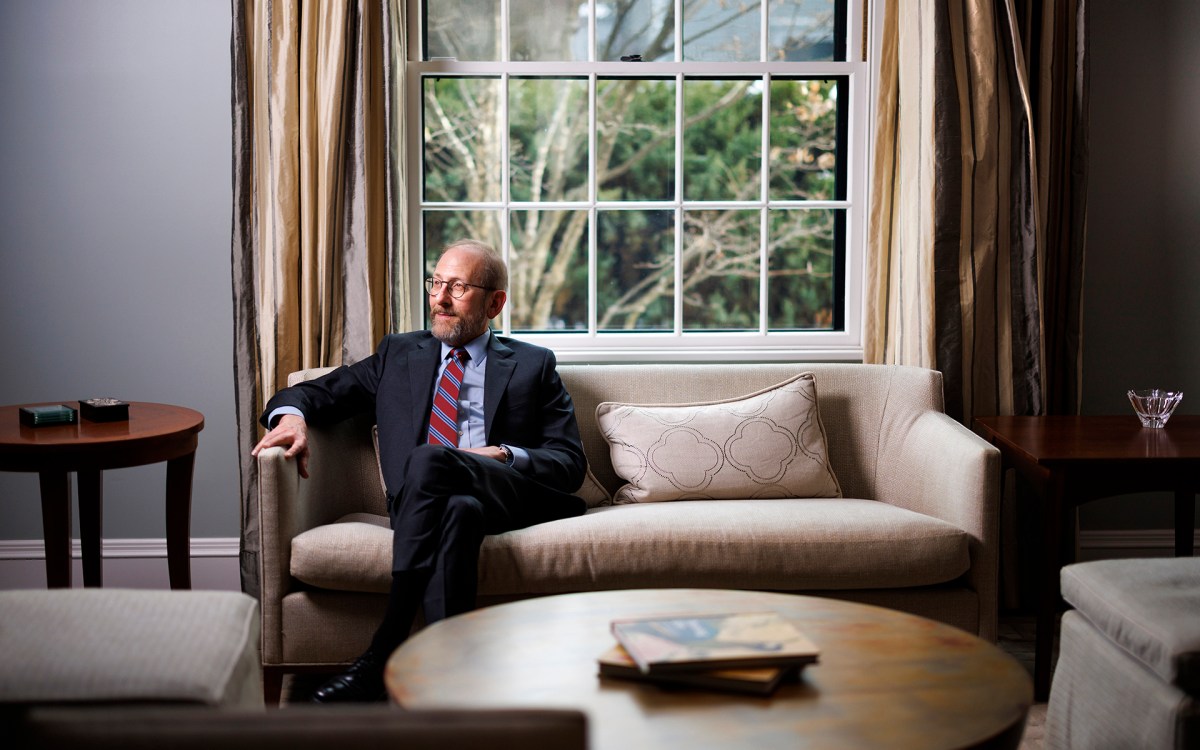Exhibit explores role of women in wartime
Letters, clippings, posters paint picture of expanding role

The women march in row after row of orderly columns, a battalion heading not to war but to work under the banner “For Every Fighter, a Woman Worker.”
From Rosie the Riveter to civil war matrons plugging bullets into gunpowder-filled shells, to the first woman in Congress voting against World War II, women have had varied roles during wartime that have evolved from largely support functions, to wartime protest, to the more active role of women in the military today.
The role of women in war is the subject of a new exhibit, “A Call to American Women: Responses to War,” at the Radcliffe Institute for Advanced Study’s Schlesinger Library on the History of Women in America.
The exhibit, arranged near the library’s entrance, draws on the Schlesinger’s extensive collection of books, papers, posters, and other documents to tell the story. Scheduled to run Oct. 3 through March 31, the exhibit will be on display in November when Radcliffe’s fourth conference on women, gender, and society occurs. The conference, “In the War Zone: How Does Gender Matter?” will examine the changing relationship between war and gender, touching on topics such as military socialization and why we fight, remembering and mourning, rape as a weapon of war, and the home front versus the battle front.

Radcliffe archivist Jane Knowles said the exhibit draws on just a small fraction of the material dealing with war at the library and covers the historical era from the Civil War through the Gulf War. In putting together the exhibit, Knowles and her colleagues were struck by how war, for all its horror, actually broadened women’s lives. From more restricted roles centered on the home, war brought women out into the workforce, into support roles on the home front, to the front lines, and to anti-war protest rallies.
“We noticed the opportunity war provides for women to do all kinds of things at home,” Knowles said. “It opens up employment for women. They are welders, like Rosie the Riveter, employed in other unusual trades.”
The exhibit, contained in four display cases and on the walls around the library’s lobby, starts with five rare Ansel Adams photographs of women from the World War II-era in the Massachusetts Women’s Defense Corps, showing them cooking meals on the banks of the Charles River and practicing the rescue of someone from a building’s rubble.
A series of large, colorful posters, from the donated collection of Sally Fox, call women to work in the “United War Work Campaign” and call on society to support their move out of the home. One World War I-era poster features a woman in overalls, holding a biplane in one hand and an artillery shell in the other and urges “care for her, through the YWCA.”
Knowles said the YWCA and the YMCA were important organizations in the war effort, providing inexpensive lodging for women filling jobs vacated by men and sending women overseas to work in canteens and provide entertainment for the troops.
In addition to supporting the war effort, women played an important role in anti-war efforts, protesting against America’s wars. One example in the exhibit is that of a supportive telegram to U.S. Rep. Jeanette Rankin, who, in 1916, became the first woman elected to Congress. Rankin was the only vote in Congress against entering World War II and issued her “Call to American Women in 1967 to protest the Vietnam War.
In addition to personal papers, letters, and notes, the exhibit includes some artifacts, such as the 1943 WAVES uniform of Hazel Hitson Weidman, a pink war protest pin, and the War Department ID and dog tags of Catherine Coyne, who in 1944 was a foreign correspondent for the Boston Herald. Coyne’s column, “Catherine Coyne on the War Front,” described the daily experience of life in Europe during World War II and followed the stories of local soldiers.
In conjunction with the exhibit, Radcliffe is seeking to expand its knowledge about the wartime experiences of its alumnae and welcomes contributions detailing those experiences, Knowles said.




